Healthcare Research All-Stars
Key Findings

Avant-garde Health's 2025 Research All-Stars identifies and highlights America's most influential physician-researchers and leading hospitals, whose groundbreaking work significantly impacts clinical practice and patient outcomes nationwide. By analyzing trends across specialties, geography, and career stages, this report provides unique insights into where and how healthcare innovation thrives. These findings offer strategic benchmarks for hospitals and clinical leaders to strengthen their research footprint, attract exceptional talent, and position themselves at the forefront of healthcare excellence.
The Scope of Research Excellence
This year's Research All-Stars analysis evaluated and identified 489 leading hospitals and more than 21,000 physician researchers across 22 medical and surgical specialties. These numbers highlight the extraordinary breadth of research occurring nationwide, from large academic medical centers to specialized clinical hubs.
| Overall | N Hospital All-Stars | N Physician All-Stars |
|---|---|---|
| Overall | 92 | NA |
Surgical Specialties
| Overall | N Hospital All-Stars | N Physician All-Stars |
|---|---|---|
| Orthopedic Surgery | 147 | 1,702 |
| Sports Medicine | 12 | 114 |
| Hand Surgery | 8 | 103 |
| Neurosurgery & Spine | 63 | 448 |
| Cardiothoracic Surgery | 45 | 313 |
| Vascular Surgery | 42 | 269 |
| ENT (Otolaryngology) | 91 | 505 |
| GI/General Surgery | 159 | 1,239 |
| Urology | 88 | 500 |
| Surgical Oncology | 18 | 82 |
| Ophthalmology | 99 | 1,289 |
| Gynecologic Surgery | 143 | 2,748 |
Medical Specialties
| Overall | N Hospital All-Stars | N Physician All-Stars |
|---|---|---|
| Internal Medicine | 182 | 4,857 |
| Cardiology | 127 | 1,558 |
| Pulmonology | 92 | 731 |
| Gastroenterology | 99 | 987 |
| Endocrinology | 52 | 464 |
| Nephrology | 79 | 623 |
| Neurology | 94 | 1,337 |
| Hematology | 83 | 796 |
| Medical Oncology | 29 | 185 |
| Rheumatology | 49 | 364 |
Our analysis highlights significant geographic clusters of research excellence, notably concentrated within major academic medical centers along coastal regions, around the Great Lakes, and within key urban hubs. As illustrated in Figure 1, these geographic hotspots reflect not only the presence of institutional resources but also strategic opportunities for hospitals to recruit and retain top-tier research talent. Figure 2 further emphasizes this trend, identifying California, New York, Massachusetts, and Texas as states leading in physician research activity—regions where competition for skilled researchers and clinicians is particularly intense.
Figure 1.
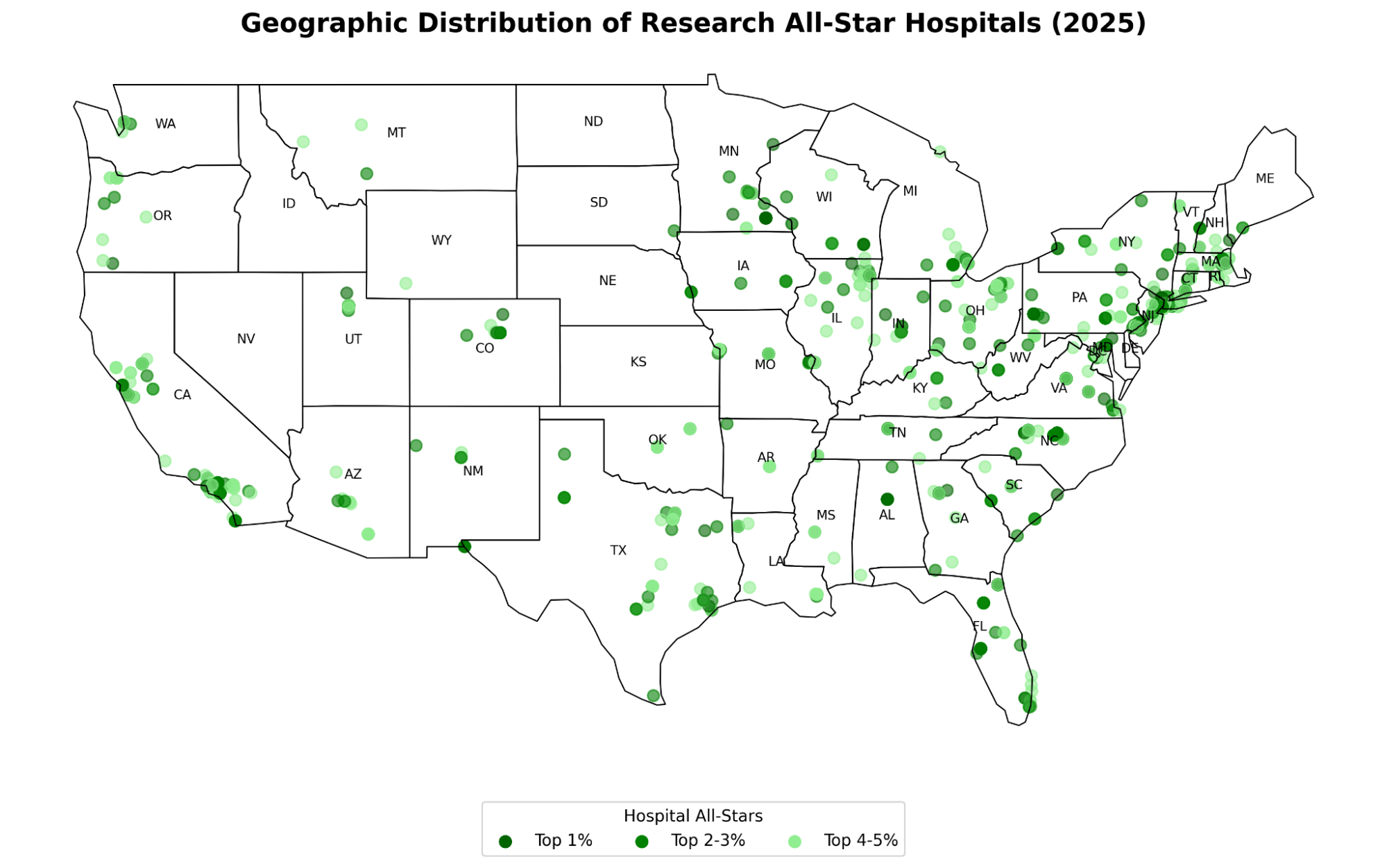
Figure 2.
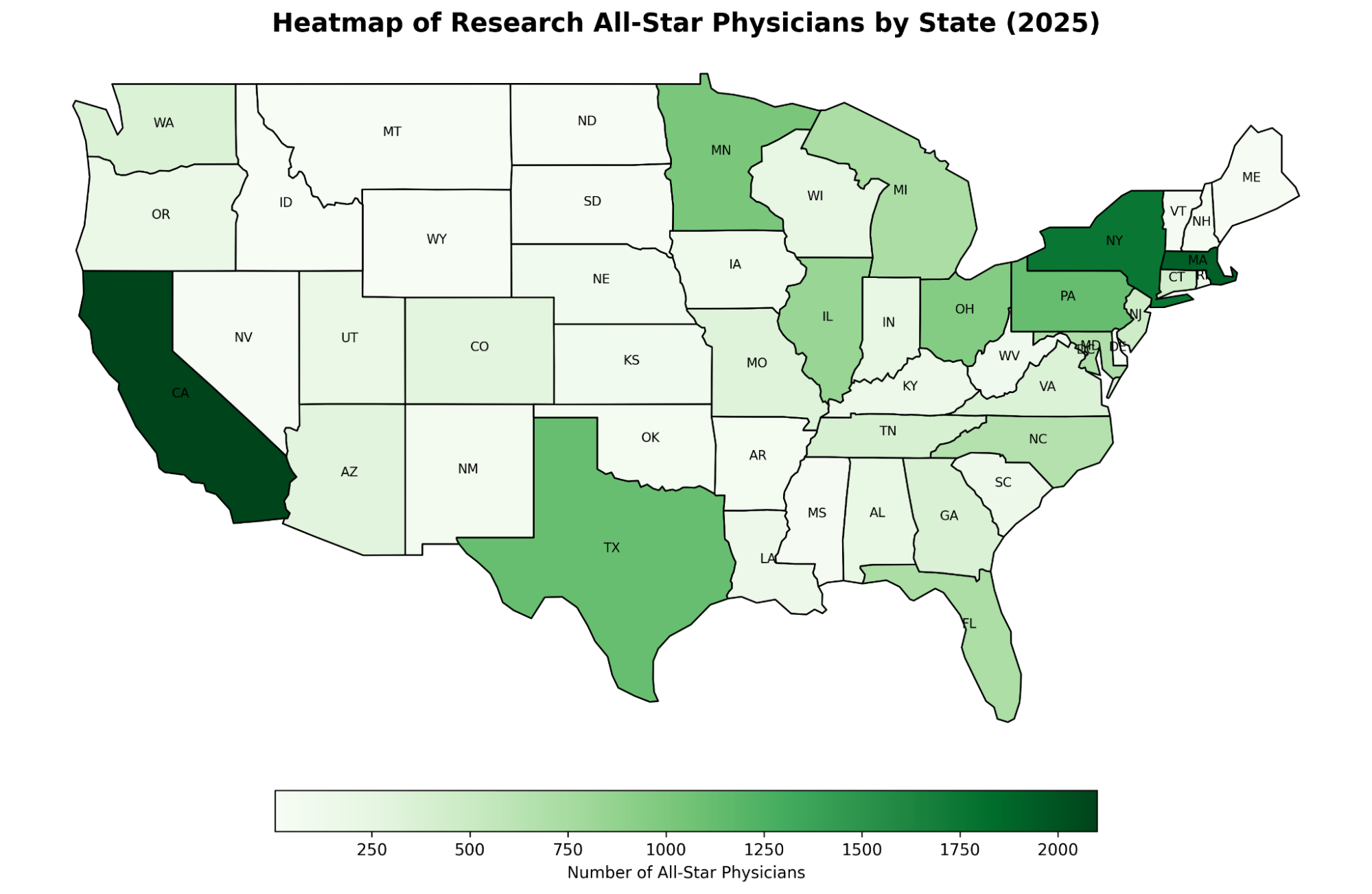
Generational Shifts: Research Leadership Across Career Stages
Figure 3 highlights the broad generational distribution of physician-researchers, emphasizing the sustained influence of researchers who graduated in the 1990s and 2000s, while notably revealing a significant rise in younger leaders emerging from more recent graduating classes. This generational diversity signals a healthy pipeline for future academic leadership, ensuring continuity in clinical innovation and institutional reputation. Hospitals and academic centers may leverage these insights to proactively develop mentorship, leadership succession, and recruitment strategies to maintain their competitive edge.
Figure 3.
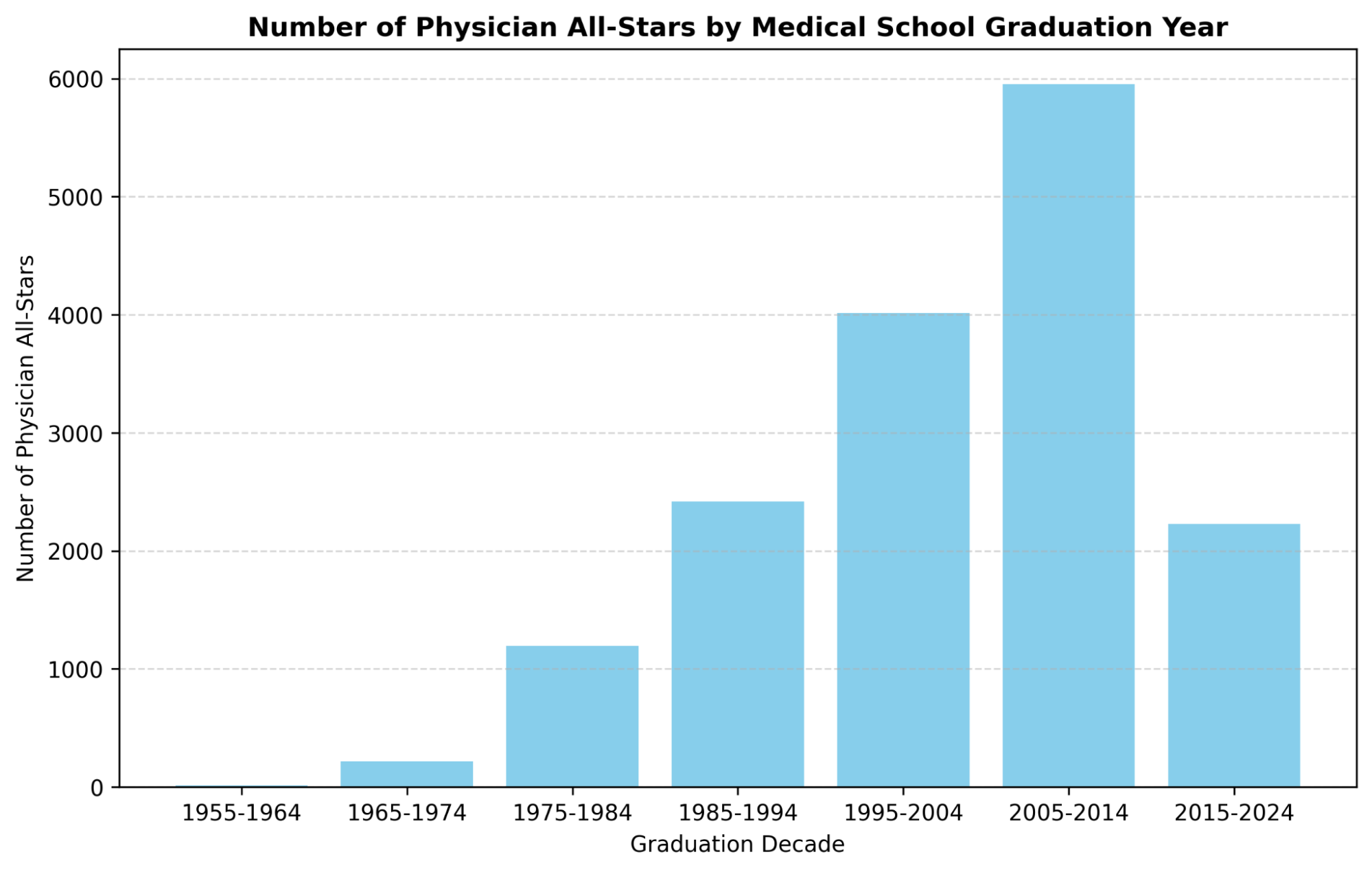
The Relationship Between Research and Clinical Volume
One of the most significant insights from our 2025 analysis is the striking difference in how research productivity interacts with clinical workload across medical and surgical specialties. Specifically, in medical specialties, there is a pronounced inverse relationship: physicians with lower clinical workloads (measured by Relative Value Units, or RVUs) exhibit notably higher research productivity. Those in the lowest RVU quintile achieved an average publication score of 8.6, while the highest quintile averaged only 3.2—reflecting the impact of protected research time, grant-funded roles, and dedicated academic positions.
Conversely, surgical specialties show a fundamentally different pattern, with publication scores consistently stable (around 2.7 to 3.0) across varying clinical workloads. This finding underscores that surgical research activities—such as procedural innovations, outcome tracking, and participation in clinical trials—are effectively integrated into daily practice.
These divergent trends carry crucial implications for institutional leadership and workforce strategy. Medical specialty departments may require deliberate strategies, including protected academic time and dedicated research support, to enhance scholarly productivity. Surgical departments, by contrast, might further leverage their existing integration of research into clinical workflows as a strategic advantage in recruitment, reputation-building, and practice innovation.
Figure 4.
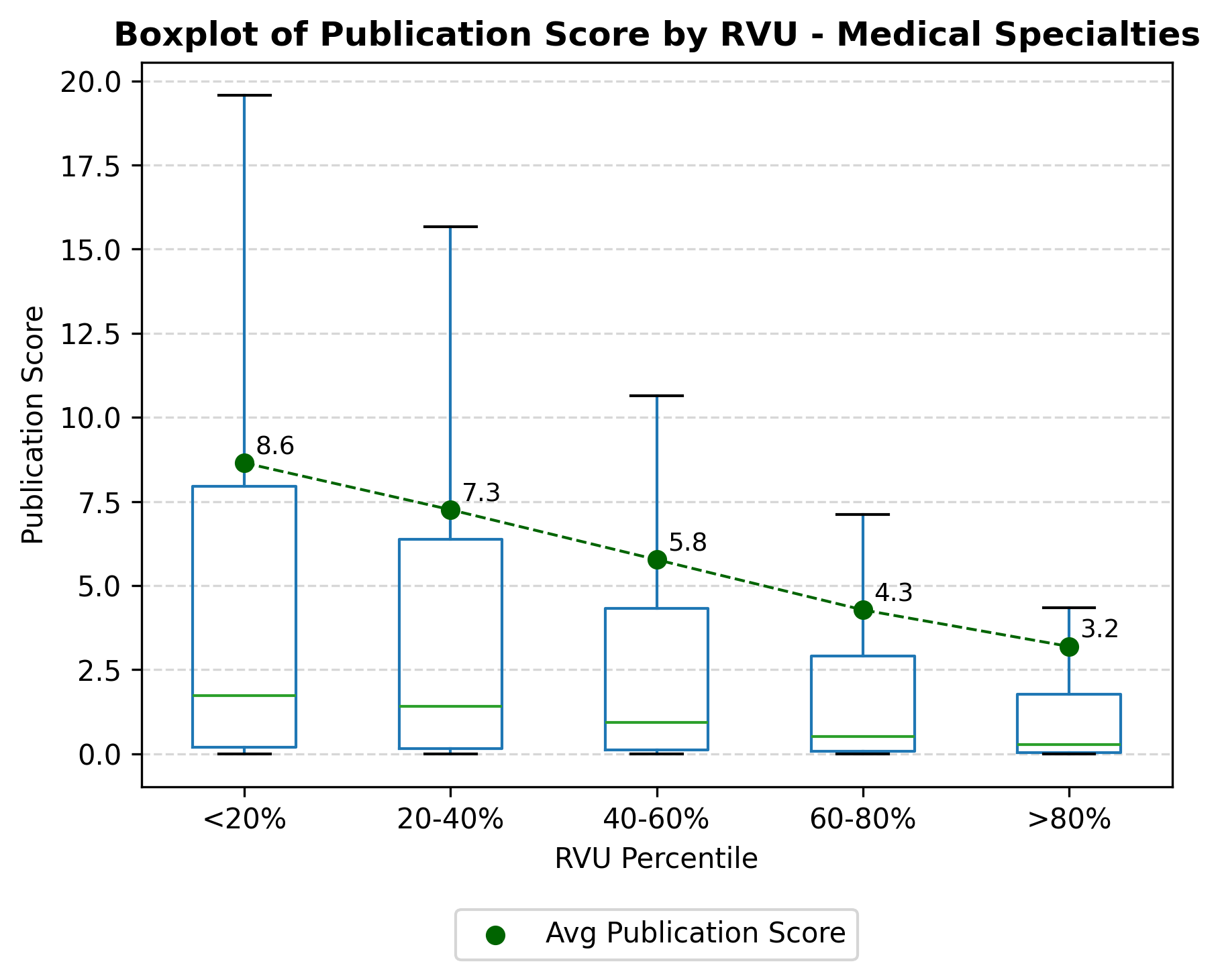
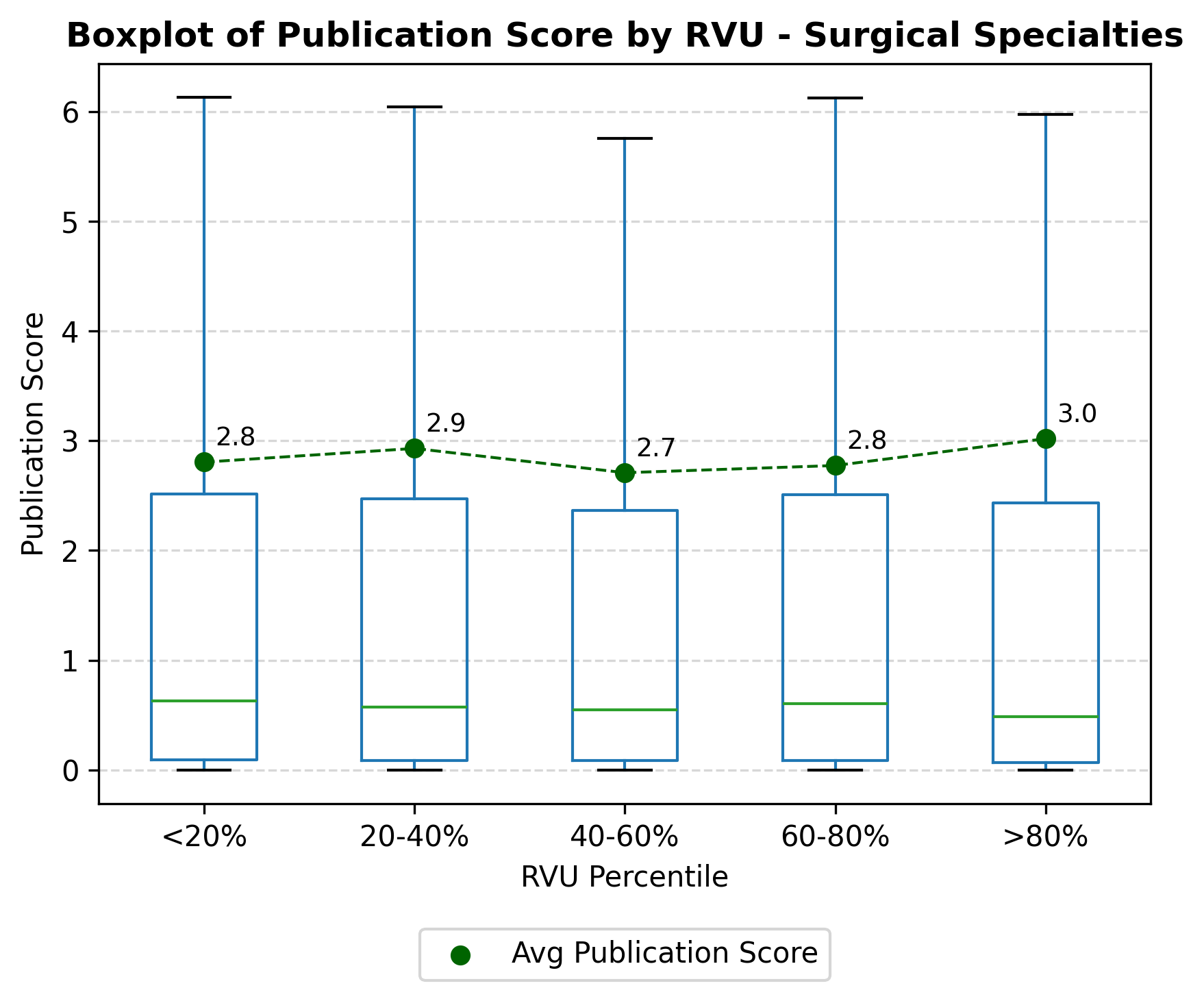
Why This Matters
At Avant-garde Health, we recognize that cultivating research excellence directly enhances institutional reputation, attracts top-tier talent, and most importantly, leads to better patient care and outcomes. Understanding these insights equips hospitals, healthcare executives, and clinical leaders to strategically nurture research productivity and effectively integrate scholarship into clinical practice.
For Hospital Executives and Department Leaders:
- Benchmark Your Institution: Clearly understand where your hospital stands in research productivity compared to peer institutions, enabling targeted improvements.
- Strategic Resource Allocation: Recognize the distinct dynamics of research and clinical productivity in medical versus surgical specialties, informing smarter decisions about workload balance and investment.
- Talent Recruitment and Retention: Leverage these insights to create competitive recruitment and retention strategies—including protected research time, grant support, and leadership training programs—to attract and keep outstanding physician-researchers.
For Physicians and Clinical Researchers:
- Personal Benchmarking: See how your scholarly contributions rank within your specialty and on a national level, offering clear visibility into your academic impact.
- Advocacy for Support Structures: Understand and advocate effectively for institutional resources, protected research time, and career development pathways that facilitate high-quality research alongside clinical practice.
- Recognition and Visibility: Gain recognition as a member of a distinguished national cohort of physician-researchers, enhancing both your personal profile and your institution’s reputation in healthcare innovation and academic excellence.
By embracing these insights, healthcare leaders and practitioners alike can actively shape an environment that prioritizes and sustains meaningful research—driving continuous improvement in patient care and clinical innovation nationwide.
